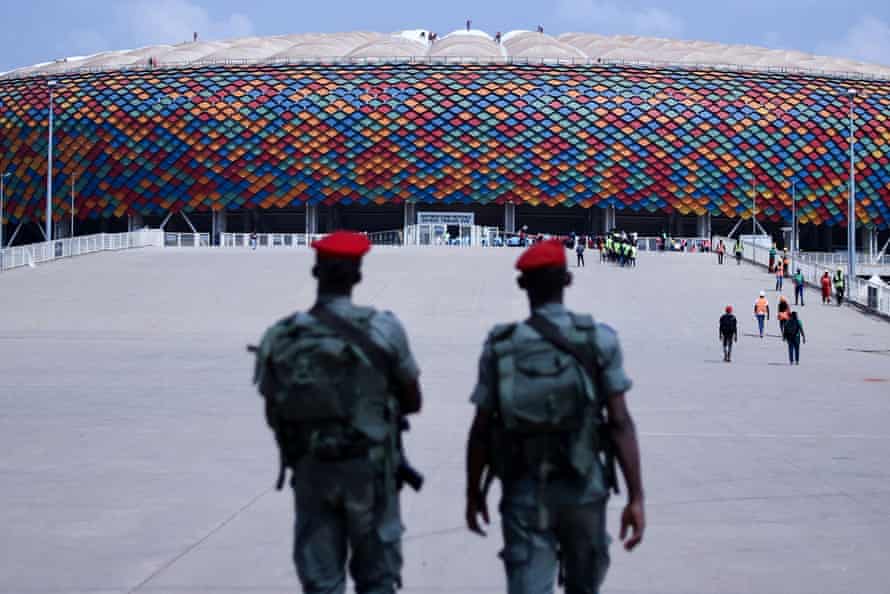Rising tension over Anglophone zones threaten to disrupt football tournament
The much-anticipated Africa Cup of Nations football tournament opens today, hosted by Cameroon for the first time for 50 years.
Yet behind the celebrations – slightly tempered by strict pandemic restrictions – are tensions from a security crisis spreading from anglophone regions, shaping daily life in Cameroon and potentially even the tournament.
Authorities in the west African country have ramped up security, particularly in the capital, Yaoundé, and other host cities across five of Cameroon’s 10 regions – with the effect of securing the tournament and bringing the crisis into view.
In Limbe, a peaceful coastal city where Mali, Tunisia, The Gambia and Mauritania will play group matches, an explosion near the city centre last Wednesday left six injured and destroyed property.
Marinette Abah, 33, was returning home from evening prayers at the time.
“We were home when we received a call that Marinette had been wounded in the explosion,” her brother Calvin Nang said. “We met her with blood all over her body.”
A faction of the separatist Ambazonia movement claimed responsibility, and the wider movement, which has condemned the government in Yaoundé as a colonial administration, has pledged to disrupt the tournament.
Tensions in the north-western and south-western anglophone regions boiled over in late 2016, when protests against marginalisation of the English language, by lawyers and teachers, were brutally put down by Cameroonian security forces.

It fuelled a rise in armed activities by separatist groups seeking independence for the English-speaking parts of Cameroon. The groups have been accused of several attacks and blasts, including against schools, escalating an education boycott that began in 2017, and depriving a generation of Cameroonian children of an education, according to a report by Human Rights Watch. Cameroonian security forces have been accused of human rights abuses against anglophones, especially in rural areas.
Many anglophones in Cameroon accuse the government of marginalisation and of attempting to assimilate their education and legal systems into the dominant francophone system.
A spokesperson for Samuel Eto’o, a hugely popular figure as one of Africa’s greatest ever footballers a former Afcon champion as well as Champions League and La Liga winner with Barcelona and now head of Cameroon’s football association, refused to be drawn on the security crisis, focusing instead on preparations for the tournament, including 30 new or renovated football stadiums and training pitches.
n an interview last month Eto’o also condemned the attempt by European football authorities to again postpone the tournament.
“If the Euros took place in the middle of the pandemic, with full stadiums in several cities in Europe and there was no problem, why wouldn’t Afcon be played in Cameroon?”
Last month, the European Club Association wrote to its African counterpart, the Confederation of African Football informing them they did not intend to release African players for 2021 Afcon in Cameroon citing rising infections.
For many in a football-loving nation, the tournament is a proud moment, where Cameroon start as underdogs behind favourites Algeria, Egypt and Senegal.
For others in the English-speaking parts of Cameroon, the tournament is a sideshow to an ongoing crisis.
Wilfred Taka, a student in Bamenda, one of the cities in the anglophone north-west, said abuses by security forces were a constant reality, as well as the activities of armed separatists.
“So many people have left Bamenda and the north-west to safer towns. Many of the businesses have shut down. For the past five years, things have not been easy,” he said.
“Hardly will the month go to an end before you will hear of killings and kidnappings.
The tournament is a good thing for the country, but would it not have been better if they had focused on peace first? But they have not done that.”
… we have a small favour to ask. Millions are turning to the Guardian for open, independent, quality news every day, and readers in 180 countries around the world now support us financially.
We believe everyone deserves access to information that’s grounded in science and truth, and analysis rooted in authority and integrity. That’s why we made a different choice: to keep our reporting open for all readers, regardless of where they live or what they can afford to pay. This means more people can be better informed, united, and inspired to take meaningful action.
In these perilous times, a truth-seeking global news organisation like the Guardian is essential. We have no shareholders or billionaire owner, meaning our journalism is free from commercial and political influence – this makes us different. When it’s never been more important, our independence allows us to fearlessly investigate, challenge and expose those in power. Support the Guardian from as little as $1 – it only takes a minute. If you can, please consider supporting us with a regular amount each month. Thank you.



No comments:
Post a Comment
Note: only a member of this blog may post a comment.